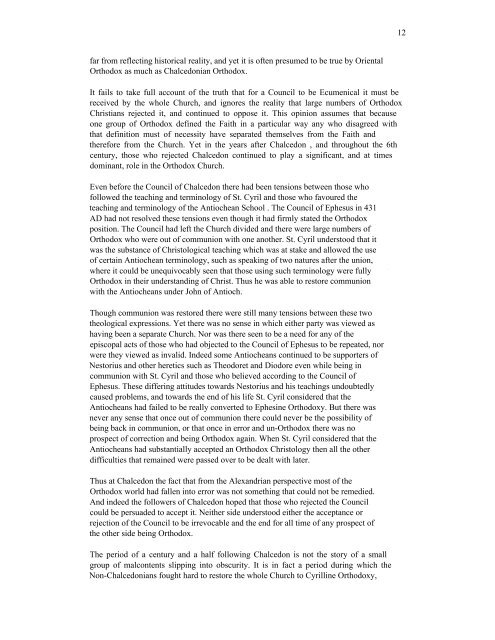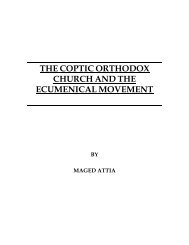Coptic interpretations of the Fourth Ecumenical Council - Saint Mina ...
Coptic interpretations of the Fourth Ecumenical Council - Saint Mina ...
Coptic interpretations of the Fourth Ecumenical Council - Saint Mina ...
Create successful ePaper yourself
Turn your PDF publications into a flip-book with our unique Google optimized e-Paper software.
far from reflecting historical reality, and yet it is <strong>of</strong>ten presumed to be true by Oriental<br />
Orthodox as much as Chalcedonian Orthodox.<br />
It fails to take full account <strong>of</strong> <strong>the</strong> truth that for a <strong>Council</strong> to be <strong>Ecumenical</strong> it must be<br />
received by <strong>the</strong> whole Church, and ignores <strong>the</strong> reality that large numbers <strong>of</strong> Orthodox<br />
Christians rejected it, and continued to oppose it. This opinion assumes that because<br />
one group <strong>of</strong> Orthodox defined <strong>the</strong> Faith in a particular way any who disagreed with<br />
that definition must <strong>of</strong> necessity have separated <strong>the</strong>mselves from <strong>the</strong> Faith and<br />
<strong>the</strong>refore from <strong>the</strong> Church. Yet in <strong>the</strong> years after Chalcedon , and throughout <strong>the</strong> 6th<br />
century, those who rejected Chalcedon continued to play a significant, and at times<br />
dominant, role in <strong>the</strong> Orthodox Church.<br />
Even before <strong>the</strong> <strong>Council</strong> <strong>of</strong> Chalcedon <strong>the</strong>re had been tensions between those who<br />
followed <strong>the</strong> teaching and terminology <strong>of</strong> St. Cyril and those who favoured <strong>the</strong><br />
teaching and terminology <strong>of</strong> <strong>the</strong> Antiochean School . The <strong>Council</strong> <strong>of</strong> Ephesus in 431<br />
AD had not resolved <strong>the</strong>se tensions even though it had firmly stated <strong>the</strong> Orthodox<br />
position. The <strong>Council</strong> had left <strong>the</strong> Church divided and <strong>the</strong>re were large numbers <strong>of</strong><br />
Orthodox who were out <strong>of</strong> communion with one ano<strong>the</strong>r. St. Cyril understood that it<br />
was <strong>the</strong> substance <strong>of</strong> Christological teaching which was at stake and allowed <strong>the</strong> use<br />
<strong>of</strong> certain Antiochean terminology, such as speaking <strong>of</strong> two natures after <strong>the</strong> union,<br />
where it could be unequivocably seen that those using such terminology were fully<br />
Orthodox in <strong>the</strong>ir understanding <strong>of</strong> Christ. Thus he was able to restore communion<br />
with <strong>the</strong> Antiocheans under John <strong>of</strong> Antioch.<br />
Though communion was restored <strong>the</strong>re were still many tensions between <strong>the</strong>se two<br />
<strong>the</strong>ological expressions. Yet <strong>the</strong>re was no sense in which ei<strong>the</strong>r party was viewed as<br />
having been a separate Church. Nor was <strong>the</strong>re seen to be a need for any <strong>of</strong> <strong>the</strong><br />
episcopal acts <strong>of</strong> those who had objected to <strong>the</strong> <strong>Council</strong> <strong>of</strong> Ephesus to be repeated, nor<br />
were <strong>the</strong>y viewed as invalid. Indeed some Antiocheans continued to be supporters <strong>of</strong><br />
Nestorius and o<strong>the</strong>r heretics such as Theodoret and Diodore even while being in<br />
communion with St. Cyril and those who believed according to <strong>the</strong> <strong>Council</strong> <strong>of</strong><br />
Ephesus. These differing attitudes towards Nestorius and his teachings undoubtedly<br />
caused problems, and towards <strong>the</strong> end <strong>of</strong> his life St. Cyril considered that <strong>the</strong><br />
Antiocheans had failed to be really converted to Ephesine Orthodoxy. But <strong>the</strong>re was<br />
never any sense that once out <strong>of</strong> communion <strong>the</strong>re could never be <strong>the</strong> possibility <strong>of</strong><br />
being back in communion, or that once in error and un-Orthodox <strong>the</strong>re was no<br />
prospect <strong>of</strong> correction and being Orthodox again. When St. Cyril considered that <strong>the</strong><br />
Antiocheans had substantially accepted an Orthodox Christology <strong>the</strong>n all <strong>the</strong> o<strong>the</strong>r<br />
difficulties that remained were passed over to be dealt with later.<br />
Thus at Chalcedon <strong>the</strong> fact that from <strong>the</strong> Alexandrian perspective most <strong>of</strong> <strong>the</strong><br />
Orthodox world had fallen into error was not something that could not be remedied.<br />
And indeed <strong>the</strong> followers <strong>of</strong> Chalcedon hoped that those who rejected <strong>the</strong> <strong>Council</strong><br />
could be persuaded to accept it. Nei<strong>the</strong>r side understood ei<strong>the</strong>r <strong>the</strong> acceptance or<br />
rejection <strong>of</strong> <strong>the</strong> <strong>Council</strong> to be irrevocable and <strong>the</strong> end for all time <strong>of</strong> any prospect <strong>of</strong><br />
<strong>the</strong> o<strong>the</strong>r side being Orthodox.<br />
The period <strong>of</strong> a century and a half following Chalcedon is not <strong>the</strong> story <strong>of</strong> a small<br />
group <strong>of</strong> malcontents slipping into obscurity. It is in fact a period during which <strong>the</strong><br />
Non-Chalcedonians fought hard to restore <strong>the</strong> whole Church to Cyrilline Orthodoxy,<br />
12








